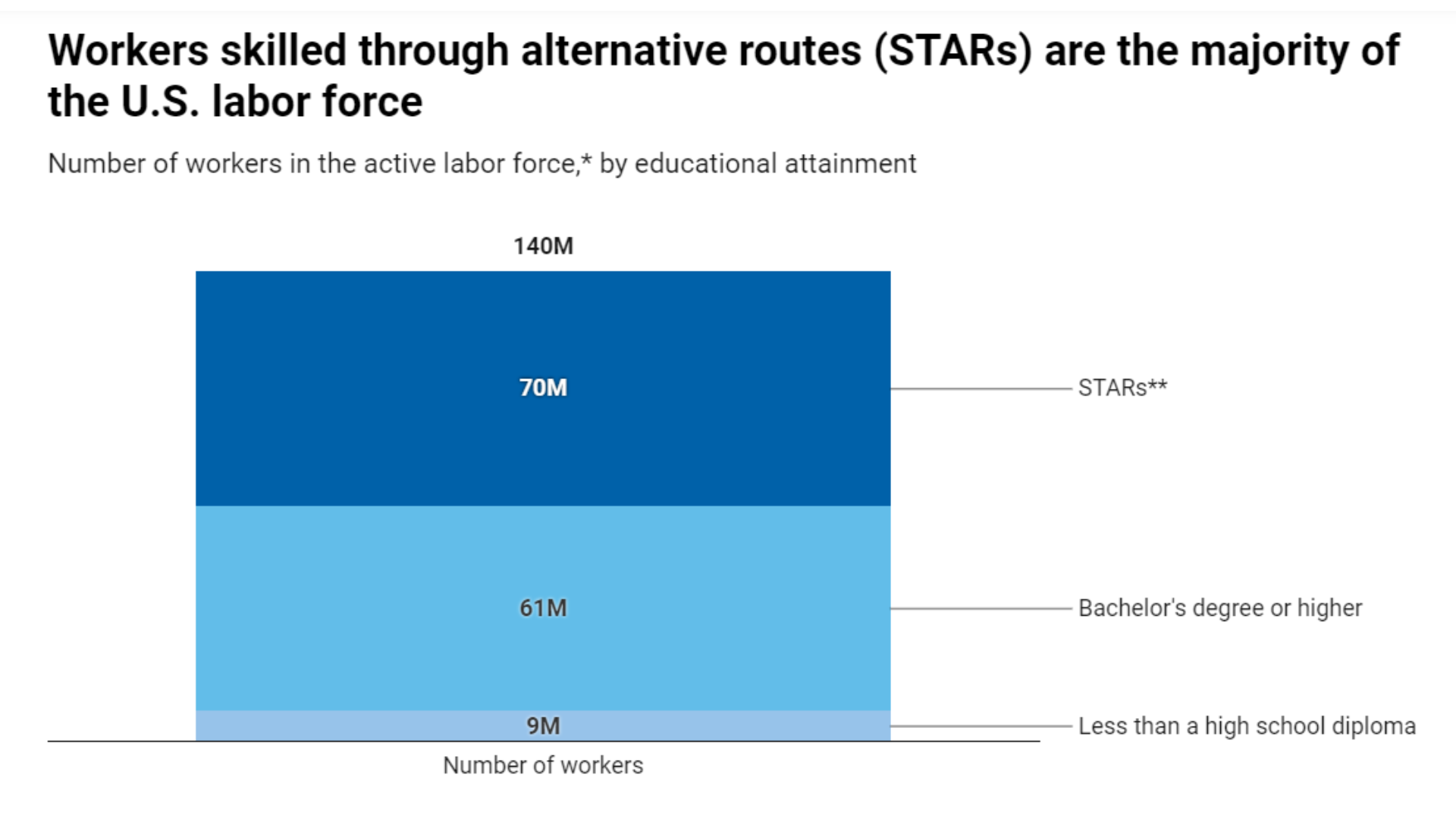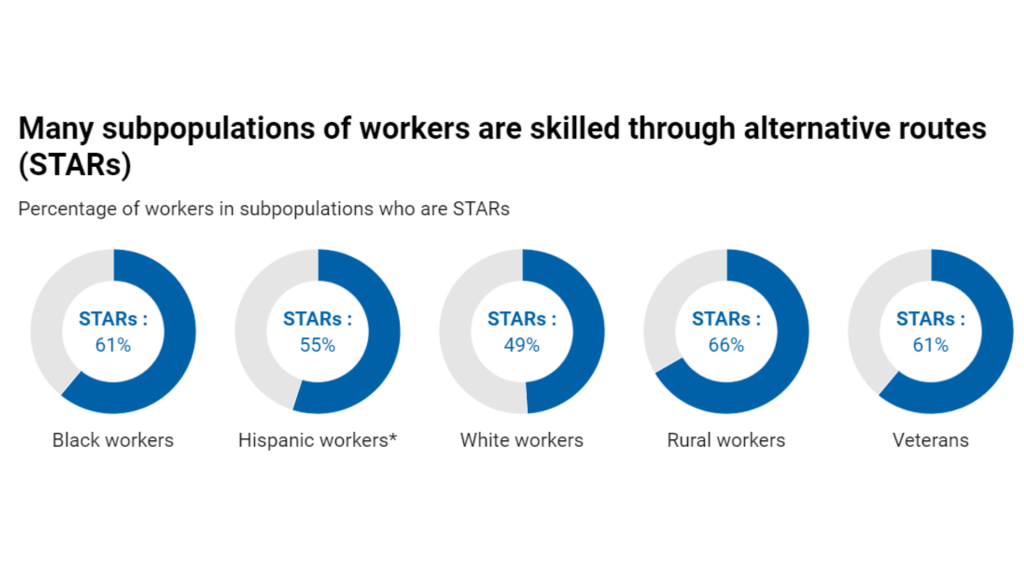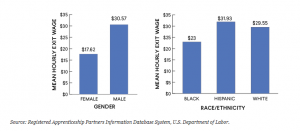Career Technical Education (CTE) equips students with in-demand skills and knowledge, preparing them for successful careers in diverse career pathways. State CTE Directors are tasked with the crucial duty of promoting the integral role of CTE in improving workforce development efforts and subsequently their state economies. CTE is a pathway to a skilled and competitive workforce and below are strategies to effectively advocate for CTE’s potential impact.
 Work-based learning experiences, such as internships, apprenticeships and on-the-job training, bridge the gap between classroom learning and practical application. Partnering with local businesses and community organizations is critical to expanding work-based learning opportunities for CTE learners. Demonstrating the tangible benefits of such experiences, including increased employability and a smoother transition into the workforce, reinforces the value of CTE as an effective workforce development pathway.
Work-based learning experiences, such as internships, apprenticeships and on-the-job training, bridge the gap between classroom learning and practical application. Partnering with local businesses and community organizations is critical to expanding work-based learning opportunities for CTE learners. Demonstrating the tangible benefits of such experiences, including increased employability and a smoother transition into the workforce, reinforces the value of CTE as an effective workforce development pathway.
This can be accomplished through elevating learner voice. Nothing speaks louder than success stories. State Directors can actively showcase the achievements of CTE alumni who have excelled in their careers after completing CTE programs. Featuring these success stories on websites, social media platforms and in local media can inspire current and prospective learners, parents and community members to view CTE as a viable path to achieving their career goals.
To strengthen CTE’s position as a workforce development pathway, an investment in modern infrastructure and technology is critical. Up-to-date equipment and technology not only enhance the learning experience but also demonstrate a commitment to providing learners with the necessary tools to succeed in the workforce. Additionally, leveraging workforce and economic trends to develop career pathways that are relevant to current labor needs creates the symbiosis needed for a properly functioning CTE ecosystem. State Directors can engage in outreach initiatives to build strong partnerships with stakeholders, highlighting CTE’s contributions to economic growth and prosperity. Engaging in conversations with employers and policymakers helps foster a shared vision and commitment to supporting CTE as a critical workforce development strategy.
Promoting CTE as a pathway to improving workforce development efforts is essential to creating a skilled and competitive workforce that meets the demands of a rapidly evolving job market. State Directors have the unique opportunity– and responsibility– to lead this transformative charge. By emphasizing industry-relevant skills, facilitating work-based learning opportunities, building strong partnerships, showcasing success stories and investing in modern infrastructure, CTE can remain at the forefront of workforce development initiatives.
For additional information, resources and tools on promoting CTE as a pathway to improving workforce development, please visit:
- The Learner Voice Toolkit which provides state and local CTE leaders with actionable resources, guidance and tools to ensure CTE learner voices are elevated and heard for the improvement of CTE policies and practices.
- Shifting the Skills Conversation: Employer Attitudes and Outcomes of Career Technical Education which provides tangible data points on employer attitudes toward Career Technical Education (CTE) and the positive return on investment CTE experiences provide for business and economic growth.
- The State Work-Based Learning Toolkit Innovation Tracker Analysis highlights key elements of the tracker and promising practices in six states. The accompanying tracker captures these toolkits in an effort to provide state and local leaders with real-life examples to adapt and implement in their own states and communities.
Brice Thomas, Former Policy Associate


 This week the House and the Senate continued to struggle to find consensus on a pathway forward on federal fiscal year 2024 (FY24) funding. With FY24 set to begin on October 1, lawmakers must pass stopgap spending legislation, known as a continuing resolution (CR), to extend current federal funding levels as negotiations on longer-term FY24 legislation continue. House Republican leaders, however, are struggling to build consensus within their own caucus about the duration and content of the CR as well as longer-term FY24 spending proposals. As a result, a government shutdown is appearing increasingly likely on October 1. While the Senate was expected to advance several more FY24 measures this week, those efforts have also failed to move forward as initially scheduled.
This week the House and the Senate continued to struggle to find consensus on a pathway forward on federal fiscal year 2024 (FY24) funding. With FY24 set to begin on October 1, lawmakers must pass stopgap spending legislation, known as a continuing resolution (CR), to extend current federal funding levels as negotiations on longer-term FY24 legislation continue. House Republican leaders, however, are struggling to build consensus within their own caucus about the duration and content of the CR as well as longer-term FY24 spending proposals. As a result, a government shutdown is appearing increasingly likely on October 1. While the Senate was expected to advance several more FY24 measures this week, those efforts have also failed to move forward as initially scheduled. Tell me more about your journey to the Fellowship.
Tell me more about your journey to the Fellowship. Tell me more about your journey to the Fellowship.
Tell me more about your journey to the Fellowship.
 Developing environmental literacy in elementary, middle and high school is essential to prepare learners for an evolving economy and to equip them with the skills and experiences they need to tackle urgent environmental challenges, both globally and in their own communities. By 2030, it is estimated that 24 million green jobs will be created in industries ranging from energy to finance and transportation.
Developing environmental literacy in elementary, middle and high school is essential to prepare learners for an evolving economy and to equip them with the skills and experiences they need to tackle urgent environmental challenges, both globally and in their own communities. By 2030, it is estimated that 24 million green jobs will be created in industries ranging from energy to finance and transportation.

